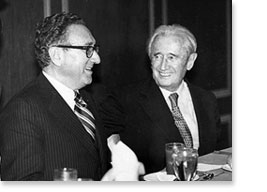|

| Ben Gurion once reproached me with
being a wandering Jew, I answered that some people have their roots in themselves
and have no need to put them down in any particular soil.... I once told
Ben-Gurion that he considered problems from the viewpoint of Sde Boker,
his little kibbutz, whereas I saw them from a plane flying twelve thousand
metres high. It is a different approach. (NG) |
Dr. Nahum Goldmann was one of the most prominent leaders of
the Jewish people and the Zionist movement during the twentieth century. Among
his many accomplishments, he was one of the founders of the World Jewish Congress,
which he served as president for many years, president of the World Zionist
Organization, and one of the architects of the reparations agreement with Germany.
The story of his life is an integral part of the history of the Jewish people
and of the State of Israel.
Goldmann was an unusual figure in the world of international
Jewish politics and the Zionist movement — a Jew and a Zionist with a profound
awareness of Jewish culture and history, yet at the same time a "citizen
of the world." Though he was familiar with and esteemed both the Jewish
classics and modern Hebrew culture, he was most at home in Western culture,
well-versed in philosophy and history, and a lover of the arts. In addition,
he was blessed with a gift for storytelling, a sense of humor, a self-deprecating
irony, openness and tolerance for the opinions of others. These qualities won
him the friendship of many world leaders and made him an effective ambassador
of his people, despite the fact that he lacked any significant political backing.

|
Nahum Goldmann with Henry Kissinger
|
|
Goldmann always zealously defended his political and ideological
independence. During his public career he frequently found himself at the center
of ideological and political confrontations. Many of his views, which provoked
fierce dissent and harsh criticism at the time, remain relevant today. As a
statesman, he was a master of the art of persuasion and personal contact, maintaining
close ties with senior figures in both the Zionist and Jewish leadership and
the top ranks of world statesmen. Many of them became his personal friends;
others, his sworn opponents.
Nahum Goldmann has been called "cosmopolitan," "a
man without roots," "the wandering Jew," — labels he did
not reject. During his long life, Goldmann held eight different passports. As
a diplomat representing the Zionist movement and the Jewish people, he spent
most of his time traveling around the world. Even after he officially settled
in Israel, he preferred to spend time in Paris and Geneva, an expression of
his political and ideological independence.
After living in Germany, Switzerland, France, United States
and Israel, Nahum Goldmann died on August 29, 1982. He was buried in Jerusalem's
Har Herzl National Cemetery in the plot of presidents of the World Zionist Organization.
 |
Texts and photos
from Beth Hatefutsoth exhibition, Statesman
without a State: Nahum Goldmann 1894 -1982, which opened on January
5, 2003. The exhibition (curated by Rahel Arbel) accompanies an international conference on Goldmann,
marking the twentieth anniversary of his passing, under the auspices of
the Zionist Research Institute at Tel Aviv University, in cooperation with
Brandeis University and with the support of the Claims Conference and the
Memorial Foundation for Jewish Culture.
Goldmann was one of the founders of Beth Hatefutsoth (the Museum of the
Jewish Diaspora) and of the Memorial Foundation. |
|

